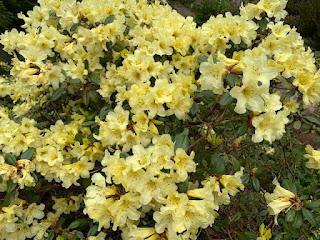 |
| I am sailing...! |
 |
| Brodick Castle |
Inside, the castle was beautifully furnished, complete with a well-equipped Victorian kitchen that shone with polished brassware – jam pans, pots, fish kettles for steaming.
 |
| Gleaming Victorian kitchen... |
But it was the assortment of quirky collectibles in the wine cellar that got my writer’s brain whirring — a set of drinking horns disguised as a family of owls, an elaborate wine jug fashioned as walrus, a glass decanter shaped like a dodo!
 |
| The owl family... |
As much as I enjoyed discovering the gems the castle offered, it was a walk in the gardens that I loved. Rhododendrons are my favourite flower and I’d timed it just right. Towering glossy bushes sprouted thick along well-kept trails; their pom-pom heads nodded, pearly white, sunshine lemon, party red. They were an absolute joy!
As a symbol of optimism and cheer (and we all need more of that!), the rhododendron is the national flower of Nepal, the state flower of both Washington and West Virginia in the United States, as well as the provincial flower of Jiangxi in China.
Which got me thinking, that the rhododendron is rarely mentioned in stories or novels. Perhaps it’s just too tricky to spell? (I admit to triple-checking my ‘o’s and ‘d’s were in the right place!) Which then reminded me of The Lost Words, written by Robert Macfarlane and brilliantly illustrated by Jackie Morris, a poetry book written for children, which quickly became a bestseller with adults too.
Macfarlane focuses on the natural world and words that are quietly slipping from children’s vocabulary, names like acorn and adder, wren and weasel. His poetry is musical, surprising; 'spells' to be read over and over again.
I was born and brought up by the coast, and enjoyed freedom to roam and play with friends in the woods and fields that surrounded us. Perhaps then it isn’t surprising that I also like to incorporate language inspired by nature in my writing.
So, I’ve set myself a mini goal for the coming months, to place a different ‘lost’ word, from Macfarlane’s book of poems, in each of my stories. I’ve already used fern and heron.
Which words do you miss from childhood? And if you were to write a book of lost words, what would it contain?
Until next time!
Rae x
 |
| The Walrus |





What words do I miss from childhood? Gosh there are a few which have been lost through the generations but were commonly used in conversation by my Cornish grandparents and parents.
ReplyDelete